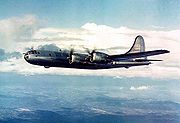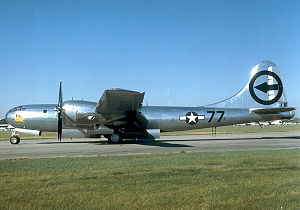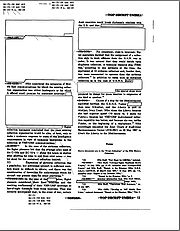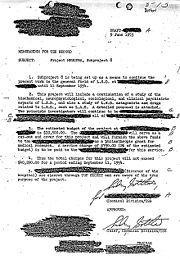
United States v. Reynolds
Encyclopedia
- This page is about the 1952 U.S. Supreme Court case about the State Secrets Privilege. For the 1878 case about polygamy and religious duty as a defense to criminal prosecution, see Reynolds v. United StatesReynolds v. United StatesReynolds v. United States, , was a Supreme Court of the United States case that held that religious duty was not a suitable defense to a criminal indictment...
.
United States v. Reynolds, , is a landmark legal case in 1953 that saw the formal recognition of State Secrets Privilege
State Secrets Privilege
The state secrets privilege is an evidentiary rule created by United States legal precedent. Application of the privilege results in exclusion of evidence from a legal case based solely on affidavits submitted by the government stating that court proceedings might disclose sensitive information...
, a judicially recognized extension of presidential
President of the United States
The President of the United States of America is the head of state and head of government of the United States. The president leads the executive branch of the federal government and is the commander-in-chief of the United States Armed Forces....
power.
Overview
Three employees of the Radio Corporation of America, an Air Force contractor, were killed when a B-29 SuperfortressB-29 Superfortress
The B-29 Superfortress is a four-engine propeller-driven heavy bomber designed by Boeing that was flown primarily by the United States Air Forces in late-World War II and through the Korean War. The B-29 was one of the largest aircraft to see service during World War II...
crashed in 1948 in Waycross, Georgia
Waycross, Georgia
Waycross is the county seat of, and only incorporated city in, Ware County in the U.S. state of Georgia. The population was 14,725 at the 2010 Census. A small portion of the city extends into Pierce County. According the U.S...
. Their widows brought an action in tort seeking damages in federal court, under the Federal Tort Claims Act
Federal Tort Claims Act
The Federal Tort Claims Act or "FTCA", , is a statute enacted by the United States Congress in 1948. "Federal Tort Claims Act" was also previously the official short title passed by the Seventy-ninth Congress on August 2, 1946 as Title IV of the Legislative Reorganization Act, 60 Stat...
. As part of this action, they requested production of accident reports concerning the crash, but were told by the Air Force that the release of such details would threaten national security. Because of the failure of the government to produce the documents, a directed verdict
Directed verdict
In a jury trial, a directed verdict is an order from the presiding judge to the jury to return a particular verdict. Typically, the judge orders a directed verdict after finding that no reasonable jury could reach a decision to the contrary...
in favor of the plaintiffs was granted by the trial court. The judgment was affirmed by the United States Court of Appeals for the Third Circuit
United States Court of Appeals for the Third Circuit
The United States Court of Appeals for the Third Circuit is a federal court with appellate jurisdiction over the district courts for the following districts:* District of Delaware* District of New Jersey...
. The United States Supreme Court reversed the decision, and remanded it to the trial court. After this, a settlement was reached with the widows, who received an aggregate sum of $170,000 in exchange for a release of liability to the Government.
Issues
- Are the Judge Advocate General of the United States Air ForceUnited States Air ForceThe United States Air Force is the aerial warfare service branch of the United States Armed Forces and one of the American uniformed services. Initially part of the United States Army, the USAF was formed as a separate branch of the military on September 18, 1947 under the National Security Act of...
and the Secretary of the United States Air Force allowed to assert privilege in the face of a suit brought under the Federal Tort Claims ActFederal Tort Claims ActThe Federal Tort Claims Act or "FTCA", , is a statute enacted by the United States Congress in 1948. "Federal Tort Claims Act" was also previously the official short title passed by the Seventy-ninth Congress on August 2, 1946 as Title IV of the Legislative Reorganization Act, 60 Stat...
and the application for production of documents under Rule 34 of the Federal Rules of Civil Procedure? - Does the doctrine in federal criminal cases of letting the defendant go free by dismissing the criminal charges in cases where evidence is not produced by the government apply to federal civil (tort) cases brought under the Federal Tort Claims ActFederal Tort Claims ActThe Federal Tort Claims Act or "FTCA", , is a statute enacted by the United States Congress in 1948. "Federal Tort Claims Act" was also previously the official short title passed by the Seventy-ninth Congress on August 2, 1946 as Title IV of the Legislative Reorganization Act, 60 Stat...
? - Was the judgment entered by the District Court under the Federal Tort Claims ActFederal Tort Claims ActThe Federal Tort Claims Act or "FTCA", , is a statute enacted by the United States Congress in 1948. "Federal Tort Claims Act" was also previously the official short title passed by the Seventy-ninth Congress on August 2, 1946 as Title IV of the Legislative Reorganization Act, 60 Stat...
against the United States Government and in favor of the plaintiffs for failure to produce the documents in question proper? - Was the affirmation of the judgment of the Third Court of Appeals proper?
Holdings
In this case, there was a valid claim of privilege under Rule 34Request for production
A request for production is a legal request for documents, electronically stored information, or other tangible items. In civil procedure, during the discovery phase of litigation, a party to a lawsuit may request that another party provide any documents that it has that pertain to the subject...
; and a judgment based under Rule 37 on refusal to produce the documents subjected the United States to liability which Congress did not consent by the Federal Tort Claims Act.
- As used in Rule 34, which compels production only of matters "not privileged," the term "not privileged" refers to "privileges" as that term is understood in the law of evidence.
- When the Secretary lodged his formal claim of privilege, he invoked a privilege against revealing military secrets – one which is well established in the law of evidence.
- When a claim of privilege against revealing military secrets is invoked, the courts must decide whether the occasion for invoking the privilege is appropriate, and yet to do so without jeopardizing the security which the privilege was meant to protect.
- When the formal claim of privilege was filed by the Secretary, under the circumstances indicating a reasonable possibility that military secrets were involved, there was a sufficient showing of privilege to cut off further demand for the documents on the showing of necessity for its compulsion that had been made.
- In this case, the showing of necessity was greatly minimized by plaintiffs' rejection of the Judge Advocate General's offer to make the surviving crew member available for examination.
- The doctrine in the criminal field that the Government can invoke its evidence privileges only at the price of letting the defendant go free has no application in a civil forum, where the Government is not the moving party, but is a defendant only on terms to which it has consented.
In a suit under the Tort Claims Act, the District Court entered a judgment against the Government. The Court of Appeals affirmed. The Supreme Court reversed and remanded.
Facts and background

A military aircraft on a flight to test secret electronic equipment crashed, and certain civilian observers aboard were killed. Their widows sued the United States under the Federal Tort Claims Act
Federal Tort Claims Act
The Federal Tort Claims Act or "FTCA", , is a statute enacted by the United States Congress in 1948. "Federal Tort Claims Act" was also previously the official short title passed by the Seventy-ninth Congress on August 2, 1946 as Title IV of the Legislative Reorganization Act, 60 Stat...
and moved under Rule 34 of the Federal Rules of Civil Procedure
Federal Rules of Civil Procedure
The Federal Rules of Civil Procedure govern civil procedure in United States district courts. The FRCP are promulgated by the United States Supreme Court pursuant to the Rules Enabling Act, and then the United States Congress has 7 months to veto the rules promulgated or they become part of the...
for production of the Air Force's accident investigation report and statements made by surviving crew members during the investigation. The Secretary of the Air Force filed a formal claim of privilege, stating that the matters were privileged against disclosure under the Air Force regulations issued under R. S. section 161, and that the aircraft and its personnel were "engaged in a highly secret mission." The Judge Advocate General filed an affidavit stating that the material could not be furnished "without seriously hampering national security," but he offered to produce the surviving crew members for examination by the plaintiffs and to permit them to testify as to all matters except those of a "classified nature." In the absence of the documents which the Air Force failed to produce, the trial court directed a summary judgment for the plaintiffs against the Government. The Appeals Court of the Third Circuit affirmed the decision. The United States appealed to the Supreme Court in certiorari
Certiorari
Certiorari is a type of writ seeking judicial review, recognized in U.S., Roman, English, Philippine, and other law. Certiorari is the present passive infinitive of the Latin certiorare...
.
Majority Opinion by Justice Vinson
The majority opinion was written by Justice Fred M. VinsonFred M. Vinson
Frederick Moore Vinson served the United States in all three branches of government and was the most prominent member of the Vinson political family. In the legislative branch, he was an elected member of the United States House of Representatives from Louisa, Kentucky, for twelve years...
: These suits under the Tort Claims Act arise from the death of three civilians in the crash of a B-29 aircraft at Waycross, Georgia
Waycross, Georgia
Waycross is the county seat of, and only incorporated city in, Ware County in the U.S. state of Georgia. The population was 14,725 at the 2010 Census. A small portion of the city extends into Pierce County. According the U.S...
, on October 6, 1948. Because an important question of the Government's privilege to resist discovery is involved, we granted certiorari.
The aircraft had taken flight for the purpose of testing secret electronic equipment, with four civilian observers aboard. While aloft, fire broke out in one of the bomber's engines. Six of the nine crew members, and three of the four civilian observers were killed in the crash. The widows of the three deceased civilian observers brought consolidated suits against the United States. In the pretrial stages, the plaintiffs moved under Rule 34 of the Federal Rules of Civil Procedure, for the production of the Air Force's official accident investigation report and the statements of the three surviving crew members, taken in connection with the official investigation. The Government moved to quash the motion, claiming that these matters were privileged against disclosure pursuant to Air Force regulations promulgated under R.S. § 161.

The same affidavit offered to produce the three surviving crew members without cost, for examination by the plaintiffs. The witnesses would be allowed to refresh their memories from any statement made by them to the Air Force, and authorized to testify as to all matters except those of a "classified nature."
The Government declined to produce the documents ordered by the District Court. The Court then ordered a directed verdict in favor of the plaintiffs. A hearing was held to determine the damages which were to be awarded to the plaintiffs. The Court of Appeals affirmed.
We have had broad propositions pressed upon us for decision. The Government has claimed privilege to withhold information in their custody, if it is in the public interest to do so. The Respondents (plaintiffs) have asserted that the executive's power to withhold documents was waived by the Tort Claims Act. Both positions have constitutional overtones. There is no need for the Court to rule on these issues, since the case has a narrower ground for decision.
The Federal Tort Claims Act expressly makes the Federal Rules of Civil Procedure applicable to suits against the United States. The judgment in this case imposed liability upon the Government by operation of Rule 37, for refusal to produce documents under Rule 34. Since Rule 34 compels production only of matters "not privileged," the essential question is whether there was a valid claim of privilege under the Rule. We hold that there was a valid privilege, therefore the judgment assessed against the United States under Federal Tort Claims Act was in error.
The Claim of Privilege applied to military secrets, and asserted by the Air Force, is well established in law. The existence of privilege is conceded by the court in this case, and by the most outspoken critics of government claims to privilege.
The principles involved indicate that the privilege belongs to the Government, and must be asserted by it; it can neither be claimed nor waived by a private party. It is not to be lightly invoked. The privilege is recognized in English law.
The instant case bears comparison to the privilege against self-incrimination. Too much judicial inquiry into the claim of privilege would force disclosure of the thing the privilege was meant to protect, while a complete abandonment of judicial control would lead to intolerable abuses.
Regardless of how it is articulated, some kind of formula of compromise must be applied here. Judicial control over the evidence in a case cannot be abdicated to the caprice of executive officers. Yet we will not go so far as to say that the court may automatically require a complete disclosure to the judge before the claim of privilege will be accepted. At this time, we cannot escape judicial notice that the country is in vigorous preparation for national defense.
There is nothing to suggest that the electronic equipment, in this case, had any causal connection to the accident. Therefore, it should be possible for the respondents to adduce the essential facts as to causation without any resort to material touching upon the material secrets. Respondents were given as reasonable opportunity to do just that when the petitioner formally offered to make the surviving members available for examination. We think that offer should have been accepted.
The decision of the trial court and appeals court is reversed and remanded.
Minority Dissent
Justice Hugo BlackHugo Black
Hugo Lafayette Black was an American politician and jurist. A member of the Democratic Party, Black represented Alabama in the United States Senate from 1927 to 1937, and served as an Associate Justice of the Supreme Court of the United States from 1937 to 1971. Black was nominated to the Supreme...
, Justice Felix Frankfurter
Felix Frankfurter
Felix Frankfurter was an Associate Justice of the United States Supreme Court.-Early life:Frankfurter was born into a Jewish family on November 15, 1882, in Vienna, Austria, then part of the Austro-Hungarian Empire in Europe. He was the third of six children of Leopold and Emma Frankfurter...
and Justice Robert H. Jackson
Robert H. Jackson
Robert Houghwout Jackson was United States Attorney General and an Associate Justice of the United States Supreme Court . He was also the chief United States prosecutor at the Nuremberg Trials...
filed a dissent that was substantially similar to that made by Judge Maris in Appeal.
Subsequent declassification of documents
The declassified accident report, released in 2000, is available on line, and indicates that the B-29 crashed because a fire started in an engine. This document also reports that the plaintiffs received a settlement of $170,000. The settlement date was effective June 22, 1953, some three months after the Supreme Court ruling. In consideration for the money paid by the government, the case was dismissed with prejudice, meaning all future litigation on this case was forfeited. The radio program This American LifeThis American Life
This American Life is a weekly hour-long radio program produced by WBEZ and hosted by Ira Glass. It is distributed by Public Radio International on PRI affiliate stations and is also available as a free weekly podcast. Primarily a journalistic non-fiction program, it has also featured essays,...
reported in 2009, that, contrary to claims made in US v Reynolds, the accident report contained no information on the secret equipment on the plane except to note that secret equipment was present, a fact which had been reported in the press at the time. The program interviewed the daughter of one of the crash victims who described the governments claims in US v Reynolds as fraudulent.
After release of the classified documents, new litigation was attempted, based in part, on a complaint that the classified material contained no secret information. Monetary damages were sought as a remedy. The initial new claim was to the Supreme Court for a writ of error in coram nobis
Coram nobis
Coram nobis or coram vobis also known as error coram nobis or error coram vobis is a legal writ issued by a court to correct a previous error "of...
, based on the claim that the use of the "secret" label in the original crash report was a fraud on the court. This was an attempt to overturn the settlement agreement of June, 1953. This motion was denied on June 23, 2003 in In re Herring. The case was refiled as Herring v. United States in the United States District Court for the Eastern District of Pennsylvania
United States District Court for the Eastern District of Pennsylvania
The United States District Court for the Eastern District of Pennsylvania is one of the original 13 federal judiciary districts created by the Judiciary Act of 1789...
on October 1, 2003. The trial court found no fraud in the government's claim of privilege in 1953.
In 2005, the Court of Appeals for the Third Circuit
United States Court of Appeals for the Third Circuit
The United States Court of Appeals for the Third Circuit is a federal court with appellate jurisdiction over the district courts for the following districts:* District of Delaware* District of New Jersey...
upheld the decision in this new litigation, in which District Court determined "there was no fraud because the documents, read in their historical context, could have revealed secret information about the equipment being tested on the plane".
Discussion and criticism of privilege in Reynolds
There has been much discussion about the use of government privilege to classify information. On the one hand, there is the need to protect government secrecy. On the other, there is always suspicion that "classified documents" are merely a way to cover-up government malfeasance, or bad faith actions of the executive branch.Prosser and Keaton

The question of "privilege" as a defense arises almost exclusively in connection with intentional torts. Negligence is a matter of risk and probability of harm; and where the likelihood of injury to the plaintiff is relatively slight, the defendant will necessarily be allowed greater latitude than where the harm is intended, or substantially certain to follow. it is the bare value of the respective interests involved and the extent of the harm from which the act is intended to protect the one as compared with that which it is intended to cause to the other which determines the existence or nonexistence of the privilege.
The relative social value given to an interest which the defendant seeks to further can affect the nature and extent of a privilege. Occasionally, the defendant may act at his peril if he makes a mistake of fact or law; at other times, an actor is justified in acting on the basis of what the facts reasonably appear to be. At other times, the defendant is justified so long as he was acting in good faith. Or, the privilege may be regarded as absolute in the sense that the court will not permit an inquiry into motive or purpose, since this could result in subjecting the honest person to harassing litigation and claims. When no inquiry is permitted into motive or purpose, it is sometimes said that defendant has an absolute privilege; when the defendant can act in either good or bad faith, with impunity, it is more properly called "immunity" rather than "privilege".
Judiciary Hearing, 2008
Many commentators have alleged government misuse of secrecy in the wake of the Supreme Court decision in the case of Reynolds. SenatorUnited States Senate
The United States Senate is the upper house of the bicameral legislature of the United States, and together with the United States House of Representatives comprises the United States Congress. The composition and powers of the Senate are established in Article One of the U.S. Constitution. Each...
Leahy
Patrick Leahy
Patrick Joseph Leahy is the senior United States Senator from Vermont and member of the Democratic Party. He is the first and only elected Democratic United States Senator in Vermont's history. He is the chairman of the Senate Judiciary Committee. Leahy is the second most senior U.S. Senator,...
in his opening remarks for the Senate Judiciary Committee's February 13, 2008, hearing on the State Secrets Privilege called the Third Circuit's decision in Herring v. United States "a little mystifying". The hearing featured testimony from several experts in the field of government privilege, and their testimony is illuminating.
The Honorable Carl J. Nichols
Testimony of Carl Nichols, Deputy Assistant Attorney General Civil Division of the Department of Justice.
Accountability is preserved by a number of procedural and substantive requirements that must be satisfied before a court may accept an assertion of the state secrets privilege. The Supreme Court in Reynolds held that such information should be protected from disclosure when there is a "danger that compulsion of the evidence will expose military matters which, in the interest of national security, should not be divulged." The Court noted that the privilege was absolute, even if the need in the plaintiff was compelling. The Fifth Circuit has noted, "the greater public good - ultimately the less harsh remedy" is to protect the information from disclosure, even where the result might be dismissal of the lawsuit.
It is well established that the President is constitutionally charged with protecting information relating to national security. As the Supreme Court has stated, "[t]the authority to protect such information falls upon the President as the head of the Executive Branch and as Commander in Chief." The states secrets privilege is not a mere "common law" privilege. Instead the courts have long recognized the privilege has a firm foundation in the Constitution as was noted in United States v. Nixon
United States v. Nixon
United States v. Nixon, , was a landmark United States Supreme Court decision. It was a unanimous 8-0 ruling involving President Richard Nixon and was important to the late stages of the Watergate scandal. It is considered a crucial precedent limiting the power of any U.S. president.Chief Justice...
where the Supreme Court noted the claim of privilege "relates to the effective discharge of the President's powers, it is constitutionally based."
In the case of Herring v. United States, where it was disclosed that the de-classified accident report from Reynolds was reviewed, Judge Davis found, "[d]etails of flight mechanics, B-29 glitches, and technical remedies in the hands of the wrong party could surely compromise national security," and thus "may have been of great moment to sophisticated intelligent analysts and Soviet engineers alike." The Court of Appeals for the Third Circuit agreed.
The assertion of the privilege is not lightly entertained, and there are multiple administrative hurdles which have to be overcome once it is chosen to be asserted. There are multiple internal reviews, and the court has the final oversight. Still, the Executive Branch is given the utmost deference, and the courts cannot get into the business of second-guessing national security and foreign policy questions.
The Honorable Patricia M. Wald
Testimony of Patricia M. Wald, Former Judge, United States Court of Appeals for the District of Columbia Circuit (1979–1999).The states secrets privilege is a common law privilege originating with the judiciary which enunciated its necessity and laid down some directions for its scope in cases going back to the nineteenth century but more recently highlighted in United States v. Reynolds. In the criminal area, the Classified Information Procedures Act
Classified Information Procedures Act
The Classified Information Procedures Act or , is codified as the third appendix to Title18 of the U.S. Code, the title concerning crimes and criminal procedures. The U.S. Code citation is .-Legislative Revision History:...
(CIPA) provides a relevant model for alternatives to full disclosure of classified information which allow a prosecution to continue while affording a defendant his or her due process rights. The time is now ripe for such legislation in the civil arena; litigants and their counsel are confused and unsure as to how to proceed in cases where the government raises the privilege; the courts themselves are confronted with precedent going in many different directions as to the scope of their authority and the requirements exercising it.
It is my opinion that the Freedom of Information Act (United States)
Freedom of Information Act (United States)
The Freedom of Information Act is a federal freedom of information law that allows for the full or partial disclosure of previously unreleased information and documents controlled by the United States government. The Act defines agency records subject to disclosure, outlines mandatory disclosure...
should allow a judge to review the material and make a determination whether the assertion of privilege is warranted. The goal should be flexibility in the interpretation, leaving the determination to the judge in the federal court.
Louis Fisher

A "state secret" refers to any information that, if disclosed publicly, would be reasonably likely to cause significant harm to the national defense or foreign relations of the United States. Few judges, reading this language, will be likely to challenge the government. I would prefer to add a second sentence to the definition: "The assertion of a state secret by the executive branch is to be tested by independent judicial review."
Concerning "immunity", I would like to see a third sentence added to the definition: "The 'states secrets privilege' may not shield illegal or unconstitutional activities." I see no reason privilege should sanction violations of statutes, treaties, or the Constitution.
Our experience with states secrets cases underscores the need for judicial independence in assessing executive claims.
Michael A. Vatis
Testimony of Michael A. Vatis, Partner, Steptoe & Johnson LLP.There are two bedrock principles which are in natural tension. Secrecy in government can be an absolute necessity to the protection of our national security. This is especially so today, where the surveillance of terrorist groups is essential.
At the same time, the second principle is equally true. Secrecy in government is antithetical to democratic governance. Too much secrecy shields officials from oversight and inevitably breeds abuse and misconduct; it thus can fatally weaken the system of checks and balances that defines our system of government.
Add to this the corollary: there are secrets, then there are secrets. Too often, information deemed classified by the Executive Branch merely echoes what was in last week's newspapers. Classified material is frequently released to the public for strictly political reasons. In truth, many "classified" documents have no reason to be called such.
See also
- List of United States Supreme Court cases, volume 345
- Jencks v. United StatesJencks v. United StatesJencks v. United States, 353 U.S. 657 , is a U.S. Supreme Court case.The petitioner, Clinton Jencks appealed, by certiorari, his conviction in a Federal District Court of violating 18 U.S.C...
- DeclassificationDeclassificationDeclassification is the process of documents that formerly were classified as secret ceasing to be so restricted, often under the principle of freedom of information. Procedures for declassification vary by country...
- Classified information in the United StatesClassified information in the United StatesThe United States government classification system is currently established under Executive Order 13526, the latest in a long series of executive orders on the topic. Issued by President Barack Obama in 2009, Executive Order 13526 replaced earlier executive orders on the topic and modified the...
Further reading
- "Daughters of the Cold War" by Michael Freedman. Legal Affairs, Jan/Feb 2004. An easy-to-read summary of the case.
External links
Link to full text opinion on Findlaw.com- Summary of case from OYEZ
- "Supreme Court Filing Claims Air Force, Government Fraud in 1953 Case," via Federation of American Scientists
- Herring v USA - Decision finding there was no fraud in the Government's 1953 claim of privilege.
- Declassified case appendix which contains the allegedly sensitive documents, via Federation of American Scientists

